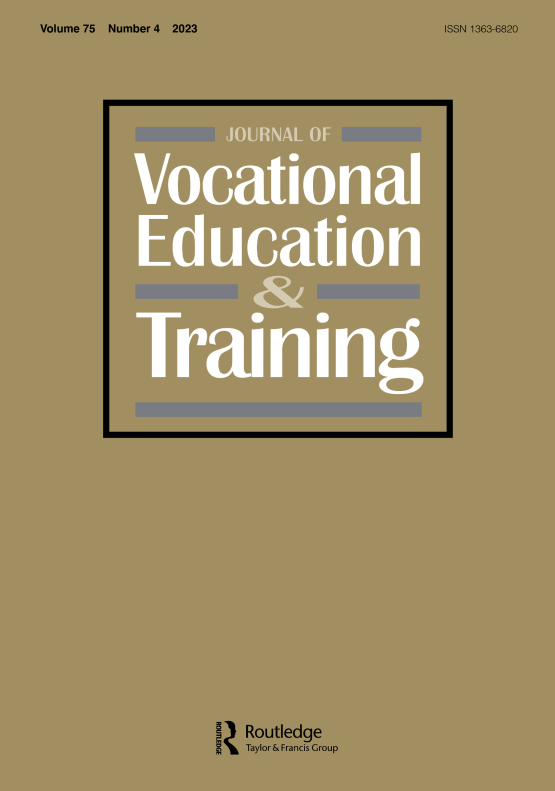Submit a Manuscript to the Journal
Journal of Vocational Education & Training
For a Special Issue on
Vocational education and training in the era of digital transformation: New forms of work and their implications for vocational learning
Abstract deadline
Manuscript deadline

Special Issue Editor(s)
Jim Hordern,
University of Bath
jh637@bath.ac.uk
Monika Nerland,
University of Oslo
m.b.nerland@iped.uio.no
Kevin Orr,
University of Huddersfield
K.Orr@hud.ac.uk
Vocational education and training in the era of digital transformation: New forms of work and their implications for vocational learning
Work practices in many occupations are changing with the introduction of advanced digital technologies and these changes stretch beyond matters of skills and qualifications. As digitalisation initiatives become more profound, many work organisations are aiming for digital transformation in the sense that the very organization of work, its meaning, values and associated aspects of occupational identity are changing (Vial, 2019). Often, these processes also include novel ideas about ways of relating to clients, users or stakeholders. Therefore, these changes in the workplace are often more human than technological. The very ways in which work is organized and enacted are affected, and employees themselves are central to this reorganisation in everyday work settings. Frontline workers are engaged in making sense of changes caused by digitalisation, altering their work practices and (re)distributing tasks and responsibilities within their everyday work (Brandenberger et al., 2023; Klein & Watson-Mannheim, 2021).
All of this has implications for vocational education and training (VET). These changes in work affect both what needs to be learned and how that learning occurs and can be supported. The workplace re-emerges as a core site for learning and expertise development in relation to ongoing changes, in which workers’ capacities to respond agentively to emerging tasks and challenges are critical (Billett, 2021; Harteis and Billett, 2023). At the same time, new forms of expertise need to be formalised and curated to become recognised in vocational learning practices and curricula. Understanding how new forms of work emerge and manifest is key to the organisation of formal qualification routes in VET which also call for critical examination of the underlying discourses and value systems (Avis, 2020; Beer and Mulder, 2020; Nerland et al., 2023).
One example is how work is changing in the healthcare sector. Here, a range of different technologies are coming into use, with high expectations of transforming services in a cost-efficient way to cope with demographic change. As described by Lupton (2017), policies typically focus on “what digital technologies can offer both lay people and professionals and how they might operate as ‘solutions’ to the problems of healthcare delivery, growing medical costs, improving people’s health and wellbeing and preventing illness and disease.” However, as research repeatedly shows, these digitalization initiatives are changing work practices rather than reducing the needs for human workers. The use of sensor alarms or technologies for automated monitoring of health conditions may reduce the regular contact between care workers and patients, but their use also generates new tasks related to considering, adapting and monitoring the technology. Rather than resolving problems, these technologies generate shifts in the distribution of tasks and responsibilities on several layers: between workers’ responsibilities and what is delegated to technologies, between workers and their clients, and on the temporal layer as a shift from curing illness as responsive activities to preventing illness or incidents from happening.
Naturally, health care is only one example. Digital transformation is apparent in many occupational sectors and affects work in areas ranging from car mechanics to legal services and algorithm-supported decision-making in occupational settings. This Special Issue aims to critically examine the workplace as a site of learning in the context of digital transformation in order to discuss and reflect on how vocational education and training is challenged and should respond to changes in expertise required in the workplace. To this end, the issue will (1) review the potential implications of digital transformation for work and vocational expertise; (2) present in-depth studies of work and learning in occupational settings affected by digital transformation, and (3) describe and conceptualise characteristics of work practices and learning that can be recontextualised within VET systems and practices.
We welcome papers that offer critical and theoretical contributions to conceptualise how digital transformations affect work and learning in occupational settings, and empirical studies based in specific occupations or workplaces of relevance for VET. Relevant topics include but are not limited to the implications of digital transformation for:
- Forms and shifts in vocational expertise
- Roles, responsibilities, and trust in the reconfiguration of work practices
- Workers’ agency and participation in learning at work
- Ways of facilitating and/or recognising learning in the workplace
- Implications for VET pedagogy and curriculum
Submission Instructions
Timeline:
- Abstracts of up to 500 words to be submitted by 8 September 2025.
- Abstracts should explain the proposed article’s aims, methods or approach, main findings and/or arguments, and implications.
- Response to the abstracts will be by the end of October 2025.
- For those invited, full papers will need to be submitted by 31 March 2026.
- Reviews of the full papers by end of June 2026.
- Revised papers to be submitted by early September 2026.
- Articles will be published in JVET online as soon as they are accepted, and the Special Issue will be published in early 2027.
If you have any queries, please contact the editors and we look forward to receiving your abstract.
Please submit your abstract online here.

